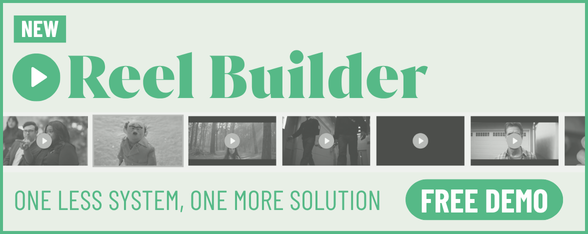
How Michelle Towse Solves the Unsolvable

Michelle Towse brings a deep trove of film and print production expertise to her role as partner/executive producer at Station Film.
Since joining Station in 2015, she has worked closely with the company’s award-winning directors across commercials and branded content, social campaigns, short films and music videos. And she’s called upon regularly as an award show judge for prestigious industry shows such as AICP Show and The Webbys.
Early in her career, Michelle spent several years as head of production for Slavin Schaeffer Films and freelance produced for esteemed commercial directors, including David Shane, Harold Einstein and Irv Blitz through high-end production companies such as Hungry Man, MJZ and HSI.
Michelle began her career in the dark room. She garnered top-notch experience as a freelance assistant for famed rock photographer Danny Clinch, and she also worked for the iconic Annie Leibovitz, printing her photos from the Clinton Inauguration, coverage of Sarajevo and celebrity shoots, including Harrison Ford, Paul Michael Glaser and Evander Holyfield.
Michelle is a graduate of Pratt Institute. She resides on Long Island with her husband.
She recently sat down with LBB to chat about creative problem solving and what it takes to learn how to be a producer, one mistake at a time…
LBB> What first attracted you to production - and has it been an industry you’ve always worked on or did you come to it from another area?
Michelle> My first career was in high fashion photography, as a black and white printer and photo assistant. But, I have always been drawn to creative problem solving, which is what led me to pursue a career in production. I definitely feed off of intense deadlines and impossible asks. There is something incredibly satisfying about solving the unsolvable.
LBB> What was your first role in the production world and how did this experience influence how you think about production and how you grew your career?
Michelle> I began my production career the old-fashioned way – as a PA. I knew pretty early on that I wanted to be the person making the decisions, so I cozied up to the production department and paid attention. I worked nights, weekends, for free or very little just to learn the ropes, and ultimately it paid off. I was very fortunate to have some trusted mentors who invested their time in me. They gave me the courage and confidence to take on jobs that I feared I was unqualified to take. I now try to do the same for the next generation of talent that have a spark and curiosity for this career path.
LBB> How did you learn to be a producer?
Michelle> One mistake at a time.
LBB> Looking back to the beginning of your career, can you tell us about a production you were involved in where you really had to dig deep and that really helped you to grow as a producer?
Michelle> LaQuinta. 1993-ish. We shot 17 days straight across the country with an 18-wheeler in tow, decked out like a LaQuinta hotel room. Big C. at the wheel. (Big C. was the nickname of Charles Pressley, the truck driver who appeared in the campaign).
Everything that could happen, happened. The Mississippi flooded its banks, tornados ripped through New Orleans. Our 18-wheeler got stuck in the French Quarter. We were boycotted in Texas and picketed in Missouri. The motorhome bathroom exploded all over our AD who had already been attacked by fire ants trying to get our 18-wheeler out of the French Quarter. Our AC went into diabetic shock during a take and the flight carrying him home had an engine fire.
Each day, I opened my eyes and braced for the next bad thing that was bound to derail us, and of course it always showed up.
I did learn a few things on that job: a good producer always has a few backup plans, never visibly panics, and remains a leader regardless of if they actually have a plan. This is because forward motion will always get you to the end result, and panic will only ever instil more panic.
LBB> A good producer should be able to produce for any medium, from film to events to digital experience. Do you agree or disagree with this statement? Why/why not?
Michelle> I do. Creative problem solving relies on the same principles regardless of implementation. The language is the same; sometimes, you just need to learn a few new vocabulary words.
LBB> How has production changed since you started your career?
Michelle> How much time do we have? I began before cell phones and computers. What took a month then takes an hour now. Pencil actuals, typed (yes on a typewriter) pre-pro books and actual printed photos of locations gave way to digital everything, and now with triple the staff.
LBB> And what has stayed the same?
Michelle> The principles of production are still the same. You still need to solve problems, build relationships, and remember to help the newbies find their way.
LBB> What do you think is the key to being an effective producer - and is it something that’s innate or something that can be learned?
Michelle> I think the best producers have an innate love and curiosity for the arts in some way. Knowing how to balance the demands of a production and the needs of the creative vision is key. It’s not always about the money. There is a time to invest to get the best outcome, and you need to care about and genuinely understand the creative intent of your director and your agency partners, and understand the needs of the brand. Also, you should be nice to people. You will never regret being nice to people.
LBB> Which production project from across your career are you most proud of and why?
Michelle> Many years ago, I worked on a motorcycle safety campaign for the Pennsylvania Department of Transportation and it featured people who lost loved ones to motorcycle accidents.
The man featured in our film was grieving the loss of his only child, while assuming a new responsibility of raising his two young grandsons.
After spending weeks together in PA filming, I returned home to a handwritten letter in my mailbox, thanking me for helping him heal and for honouring his daughter’s life in such a beautiful way. That experience has never left me. Never will.
LBB> And in terms of recent work, which projects have you found to be particularly exciting or have presented particularly interesting production challenges?
Michelle> I recently began creating short-form original content for social distribution, and it has been an absolute blast. The first show we are dropping is a collaboration with a fluffy, pink, jazz-scatting diva named Blossom. And while the basics of production do not vary much from commercial to social, understanding how to create content that is consumable for a social audience is definitely a very different beast.
LBB> Producers always have the best stories. What’s the hairiest/most insane situation you’ve found yourself in and how did you work your way out of it?
Michelle> About an hour after striking a half-million-dollar-set and watching it all go into the dumpster.
I got a phone call from the EP asking where we were storing the set pieces for the next shoot. I thought I was being punked. Turns out, buried very deep in an email (about a week after emails began replacing messengers and actual conversations), there was a file that mentioned they may want to save the set. Whoops.
In the end, I was not the only one they forgot to tell – they also missed the bidding producer and the set designer, so all was well. But it was a rather terrifying hour.
LBB> As a producer your brain must have a never-ending "to do" list. How do you switch off? What do you do to relax?
Michelle> Good or bad, I do not have an off switch. Never have.
In terms of relaxing, I LOVE to travel, and working out is very cathartic for me.
LBB> Producers are problem solvers. What personally fuels your curiosity and drive?
Michelle> I am a painter, a photographer, am good at math, and have a natural curiosity for how things work. I think it’s the combination of those things that keeps my mind in motion.
LBB> What advice would you give to people who are interested in becoming a producer?
Michelle> A few things come to mind. First, do not fear the future; face it head on.
Second, do not rush your decisions. I think the best producers do not force answers too soon for the sake of taking another item off of their ‘to do’ list. There is a real craft to waiting for the right answers to find you at the right time. Many unforced errors will find you if you move more quickly than you need to, which I know sounds counter to the job, but trust me, learning as much information as you can before making decisions will always serve you well.
LBB> From your experience what are the ingredients for a successful production?
Michelle> Good energy always yields the best results. I have a ‘no cranky people’ policy. Production is hard enough without bad energy infecting it.
LBB> What’s the key to a successful production-client relationship?
Michelle> If it matters to you, it matters to me. Those are the words I live by, and they have not failed me yet.
LBB> Producers are naturally hands on - they have to be. How do you balance that in the more managerial role of an EP?
Michelle> For me, the balance is giving producers enough space to do their jobs while staying close enough to support them when they need it.
I happen to like teaching and mentoring, so I want our staff and freelancers to feel they can come to me with anything, but not before they have exhausted their own bandwidth or knowledge to solve what is solvable on their own.
















